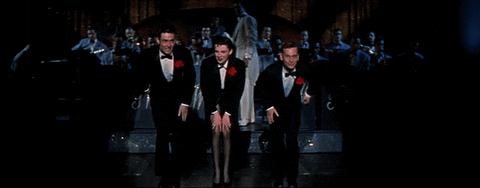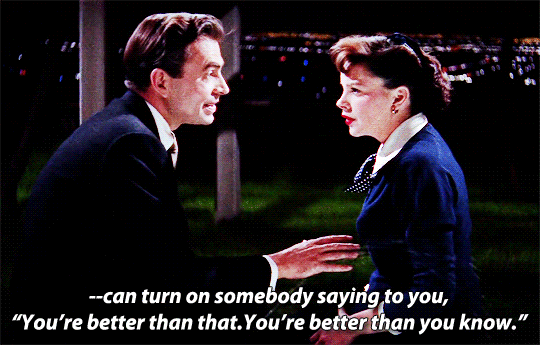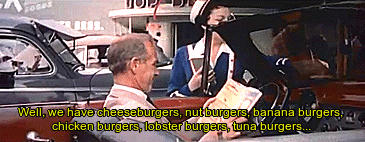When life unfortunately imitates art.

A Star is Born is a tale of addiction and fame that has four film adaptations that have nothing to do with the fact it’s clear Oscar bait (although Judy did famously lose this one to Grace Kelly). Did you guys know the entertainment industry changes and exploits people? I surely didn’t realize this until now, and that’s why the academy has consistently rewarded movies that talk about how weird Hollywood is. Y’know. Cause there’s so few of them.
I’m being glib, as this movie is probably one of the more sympathetic views of the big studio system, for all its flaws. It focuses on Esther Blodgett, a singer in a touring band, and how her encounter and subsequent relationship with big-star actor Norman Maine changed her career, and thus her life. This film is 3 hours long (it used to be both shorter and longer, for reasons explained later), and it *feels* that long. For every moment of levity there are 30 minutes of pain, and while this feels tedious sometimes, it does a great job of illustrating the highs and lows of caring for someone struggling with addiction. They burn so brightly in those small moments when everything is spectacular that it’s almost worth slogging through the periods of grim instability that does nothing but foreshadow a bleak future.
For those of you unfamiliar with the story I will give a rundown below. If you’re curious how this 1954 version differs from the other three films, Be Kind Rewind has an excellent video that you should watch after reading this. Seriously though, check out her channel, it’s incredibly informative.

Esther Blodgett (Judy Garland) and the Glenn Williams Orchestra, lead by her buddy Danny McGuire (the adorable Tommy Noonan, who will forever be Gus in my eyes) have booked a gig during a benefit concert. Norman Maine, a famous Hollywood actor, is supposed to perform as well, but he shows up drunk as a skunk and is having much more fun harassing the cast and crew than he is preparing to go on stage. While his PR agent Matt Libby has correctly identified Norman is in no position to be in front of people, he tries to distract him by sending him to the dressing rooms to be interviewed. This works for about 5 minutes until he hulks out and joins Esther and the gang on stage just for funsies.
In the sprit of ‘fuck it, we’ll do it live’, Esther succeeds in getting Norman involved with the act as comedic relief, he gets the positive attention he craves from the audience, and everyone laughs like this isn’t a big disaster played out in public.
Norman tries to thank Esther for saving him from looking even more like an ass by trying to get her to go to a second location with him. Even though Esther finds this strangely sweet, Danny wisely helps her escape to their next gig and Libby takes Norman home to sleep it off. That would be the end of it if Norman didn’t arise from the grave like a vampire at 2:30am to hunt down Esther like she’s his prey. He finds her at a club on Sunset where her and her friends are rehearsing, and oh my god, it’s so glorious.
I love Judy’s voice; I get goosebumps every time I hear her. She’s such a powerhouse.
Also, FUN FACT: The composer of this song, Harold Arlen, scored Gay Purr-ee, so if you also think “The Man That Got Away” bares a striking resemblance to “Paris is a Lonely Town”, there’s a legitimate reason for that.
A now-sober Norman bombards Esther with metaphors about her excellence and gradually isolates her from the group by physically dragging her around. Danny tries to separate them, but Esther leaves with Norman all the same to go back to her place and discuss her career goals. When she reveals she wants to get a #1 record on Hit Parade, Norman retorts that Esther’s dream is not big enough and she’s wasting her time paling around with undignified gig musicians. Esther is only slightly insulted by Norman’s blatant disregard of the work she’s already put in to get where she is, but buys into his promise to snag her a screen test. Esther then breaks Danny’s heart by quitting the band and asking them to move on to San Francisco without her. Danny tries to change her mind by suggesting she might not want to trust a flake (no matter how charming he is), but Esther believes Norman sees potential in her nobody else has, igniting her desire to aim higher.
Of course Norman gets loaded after leaving Esther’s house and his late night call to the head of the studio, Oliver Niles, is completely blown off as Norman trying to impress some broad he likes. Instead, the studio ships Norman out to work on his next picture, completely abandoning Esther for 5-6 weeks. Esther, never hearing back from Norman, moves into a cheaper place and gets a job as a roller skating waitress in an attempt to make ends meet while she attends auditions. She manages to book a VO gig singing in a shampoo commercial, which helps Norman locate her upon his return because he recognizes her distinct voice on the television. After tracking Esther down at the boarding house she’s slumming in, Norman finally follows through with his promise and lands her a screen test.
This montage of Esther and Norman separating and reuniting is particularly bizarre as it is presented as pages in Esther’s scrapbook – still sepia-tinted images with the character’s dialogue dubbed over it. It didn’t feel intentional, as some of the scenes are live action, like a car or a bus pulling away from a building, or a shot of a woman’s hand dipping into shampoo. I initially assumed this artistic decision was to cut down the film’s length, but the dialogue was still there, so it wasn’t succeeding if that were the goal. I later discovered the version of the film I was watching was the “restored” director’s version, as the original wide-release had 30 minutes removed by order of the studio in an effort to cut down its considerable runtime. Unfortunately, when Ron Haver, the film curator at the L.A. County Museum of Art, attempted to find the lost footage for the film’s 1983 re-release, he discovered these scenes were truly lost to time (literally, as they could not find the original film reels). Their “remedy” included displaying production stills with VO from the audio tapes they were able to locate. Honestly, I think all of this particular section could have stayed on the cutting room floor, as it’s a 30-minute detour that ends with Norman getting Esther the screen test, anyway. I’m assuming these scenes were included as a way to show Norman struggling to help Esther despite his alcoholism, and Esther’s new commitment to become famous. We get those impressions through their initial interactions, so this not-so-little side-quest truly feels redundant. Later lost scenes, however, such as (spoiler alert) Norman’s marriage proposal to Vicki, are pretty baffling omissions. I don’t think the cuts robbed Judy of her Oscar win like Lorna Luft does, but it does fuck up the movie’s continuity.

Upon Esther’s first visit to the studio, the makeup department completely change her look after going into great detail about her flaws. Norman hates the outcome and redoes her makeup to restore Esther’s natural beauty. Although Esther is nervous, she nails the audition and starts to book small parts, like those that require putting on a full face of makeup only to wave out the window of a train. They even yell at her when they see her face, which is as blatant of a metaphor for being a woman in showbusiness if I ever saw one. After the studio changes Esther’s name to Vicki Lester, Norman convinces Oliver to cast Vicki as the lead in a new picture after their previous one bailed. Upon release, the film becomes a wild success, and Vicki Lester’s star quickly rises
Y’know, I really want to take a tally of the percentage of the musicals on this list that feature their white stars in blackface or parody other racial stereotypes, cause it’s more than I thought it would be. Judy’s daughter Lorna has mentioned Judy’s foray into impersonating other races was “of its time”, but I’m finding it incredibly exhausting and lazy that blackface is consistently used as shorthand for being poor or othered.
While the first half of this movie isn’t necessarily incredibly upbeat, the rest of it goes downhill from here. While Norman’s newly released movie is getting terrible reviews, everyone is now obsessed with Vicki. Feeling as though he’s done what he could to introduce Esther to the world, Norman tries to leave her, citing he’s an too-old disaster that will only drag her down. Esther responds to this by confessing her love to him, and instead of Norman bailing, they quickly get engaged in the creepiest eavesdropping-est way on the back of the promise that Norman will quit drinking.
The pair first run to the head of the studio because apparently they need his permission to move forward with this doomed marriage. Oliver gives his approval hoping that Vicki will be the positive influence that helps Norman stay on the straight and narrow. While Libby feels as if they’re setting a trap for Vicki, he agrees to spin the story for the positive in order to give Norman some much needed good press. Of course they exhaust any temporary good-will Libby was extending to them when the embarrassingly-named Mr. Earnest Sydney Gubbins and Esther Blodgett elope to a tiny courthouse to get married in secret. When they reach their roadside motel honeymoon destination, Vicki hears her new song “It’s a New World” on the radio as it reaches #1 on Hit Parade, implying that all of Esther’s dreams have now come true.
They start their new life by purchasing an expensive house on a ocean-side cliff, only for Oliver to break the news to Norman that the studio has decided to let him go because of his inconsistent behavior. Libby publicly plays it off like Norman is pursuing other opportunities, while in reality he’s relegated to a house husband, making sandwiches, taking messages, and pensively putting golf balls. While Norman seems generally supportive of Vicki’s budding career, a delivery man calls him Mr. Lester and the bruise to Norman’s ego sends him into a bender. This starts to jeopardize Vicki’s career when Norman decides to crash her Oscar acceptance speech by stumbling on stage and publicly declaring he needs a job.
3 months later, Norman is in rehab and Vicki is on set filming her latest movie. When Oliver comes to check on her, Vicki breaks down to one of the few people that understand her predicament, as she’s both frustrated and scared by Norman’s behavior.
Judy serves a heartbreaking performance during this monologue, with many speculating that this particular story hit too close to home. Judy’s life somewhat mimicked Norman’s, as she was fired from MGM because of her inconsistent behavior as a result of her own addictions. She was forced into the entertainment industry before she turned 3 years old, and even as a child was given amphetamines to keep her working and skinny. As she got older those habits became harder to break, especially when barbiturates were added to the mix to help her sleep. Most of her life had been spent earning money to provide for her parents, and then her own family, without the ability to choose if she could keep her pregnancies, or take time off after she was allowed to have Liza, in order to keep the checks rolling in for the studio. After years of constantly working with the help of prescription drugs, Judy struggled with mental health issues that the studio went through great lengths to hide, and the press was ecstatic to exploit.
Judy’s husband at this time, Sid Luft, produced A Star is Born in order to cast Judy in this role and make the movie a musical. Filming was difficult, but both Judy and James gave outstanding performances, as you feel the love between them while the heartbreak of addiction takes a toll on their marriage. Judy and Sid’s relationship similarly didn’t work out, as Sid confessed it was too difficult being with her. Judy hated him toward the end of her life as custody battles kept her from her children. If you’ve listened to any interview with Judy or her kids, she was incredibly loving and supportive of them, valuing her family over everything else. She ended her life completely disillusioned with the same industry that lifted her up, because they were even more gleeful in knocking her down by depriving her of her own voice.
Judy is mostly remembered as a young girl belting out “Somewhere Over the Rainbow”, or bounding around with Gene Kelly or Fred Astaire in romantic comedies, but this movie (specifically this scene) shows how underrated as a dramatic actress she was. The end scene of this movie between Esther and Danny legitimately scared the director, as Judy had never screamed on camera before. During Judy’s eulogy, James Mason said “she could wring tears out of hearts of rock,” and he’s not wrong.


Upon Norman’s release, he runs into Libby, who lashes out at him in frustration, leading to a physical altercation that Norman follows up with another bender. After several days of no-contact, Oscar and Esther find him in jail on a drunk and disorderly charge after he crashes his car, and Esther begs the judge to let him come home with her so she can take care of him. She puts Norman to bed and confides in Oliver she’s quitting the business to take care of her husband and give his sobriety a fighting chance. She has forced herself to believe that love will now be enough, and that Norman can be fixed if she can devote her time to him. When Oliver protests because Norman’s career is through, Esther reiterates she wouldn’t have her career without Norman’s connections and encouragement. Unfortunately Norman overhears this conversation from the other room, and takes it upon himself to release Esther from the burden of being his wife by wading into the ocean and drowning.
As much as Esther wants to process her grief in her own time, her good friend Danny pushes her to rejoin the land of the living by attending the same benefit concert she performed at a year ago when she met Norman. Norman was incredibly proud of the fact he discovered Vicki, and Danny posits he would be disappointed if she threw it all away because of him. Vicki decides to show up at the shrine, and when she takes the stage to introduce herself as Mrs. Norman Maine, the crowd goes wild. While they were dismissive of Norman and his disease while he was alive, they revere him and support Vicki after his death.
This is not a movie I would revisit often, as it emotionally takes a toll, but this is an absolute must-watch. Judy’s performance proves why she’s considered a legend – she’s funny, flirty, hopeful, frustrated, heartbroken, and devastated, and all-the-while her voice is a goddamn masterpiece. James Mason similarly does a splendid job at portraying a charismatic and caring, but flawed and proud protagonist. I’m fairly uninterested in seeing the other versions, as I could easily be happy with this being the definitive telling of this story. Judy is absolutely everything, I don’t know why anybody else would even try competing with her performance.



